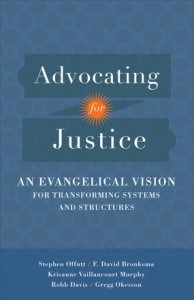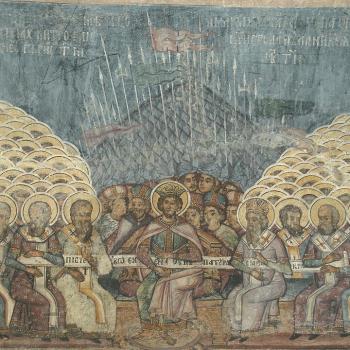 This guest post comes from Steve Offutt, a professor of development studies at Asbury Theological Seminary. He is author of New Centers of Global Evangelicalism in Latin America and Africa (Cambridge University Press 2015) and editor of an important new book, Advocating for Justice (Baker 2016), that challenges older evangelical approaches to development work.
This guest post comes from Steve Offutt, a professor of development studies at Asbury Theological Seminary. He is author of New Centers of Global Evangelicalism in Latin America and Africa (Cambridge University Press 2015) and editor of an important new book, Advocating for Justice (Baker 2016), that challenges older evangelical approaches to development work.
***
When evangelicals think about how to alleviate poverty, they rely on two books: When Helping Hurts (2009), by Steve Corbett and Brian Fikkert, and Walking with the Poor (1999), by Bryant Myers. When Helping Hurts has been wildly successful in reaching the evangelicals in the pews: Moody Publishers reports selling more than 300,000 copies. Walking with the Poor has informed evangelical faith based development initiatives around the world. It has been translated into numerous languages and can be found in many field offices of organizations like World Vision and Compassion International.
The approach to poverty both books take is called transformational development. It ultimately defines poverty as, and traces its causes to, a series of broken relationships – with God, other people, creation, and oneself. Transformational development is the restoration of these relationships, and the goal and ultimate result of such efforts is shalom. The approach has done much good, and these two books have energized evangelicals to care about poverty and provided theoretical coherence to evangelical community development efforts.
There are, however, several downsides to this approach. Advocating for Justice points to four of these. The first is that privileging the definition of poverty as broken relationships over that of a lack of material resources represents a deviation from the biblical notion of poverty, which repeatedly focuses on economic and material concerns. Second, even though the authors of When Helping Hurts and Walking with the Poor are obviously concerned with ending material poverty, this definitional conflation leads to confusion. This is because some who are materially rich have a “poverty of relationships” with God and others, but they are not and should not be considered poor by any normal definition of poverty. Moreover, those who are poor often have excellent relationships with God, others, and themselves. Third, and related to the second, this kind definition feeds the temptation of evangelicals (and many others) to view the poor as spiritually and relationally inferior because the default assumption is that those who are materially poor are also spiritually poor, and vice-versa, which is ironically one of the very things that these authors warn against.
Finally, privileging the relational definition as a cause of poverty tends to lead to a shying away from acknowledging the role political advocacy can play in reducing poverty. For example, while Corbett and Fikkert explain the “systems” that make it difficult for the poor to escape their poverty they do not include addressing these power structures through political advocacy in the three action categories they offer to alleviate poverty: relief, rehabilitation, and development. Similarly, when Bryant Myers produced an otherwise excellent revised and expanded edition of Walking with the Poor, he gave only a perfunctory nod to political advocacy. He does expand his comments on advocacy from a page and a half in the first edition to scattered mentions on thirteen different pages in the later work. But clearly, the most widely read books by evangelicals on poverty reduction largely leave the tool of political advocacy to one side.
 Advocating for Justice argues, on the other hand, that an evangelical theory and practice of development must be willing to address power through what it calls transformational advocacy. It defines transformational advocacy as intentional acts of witness by the body of Christ that hold people and institutions accountable for creating, implementing, and sustaining just and good policies and practices geared toward the flourishing of society. In this way it calls evangelicals to continue with their evangelism and community development efforts, but to also “swim upstream” when needed.
Advocating for Justice argues, on the other hand, that an evangelical theory and practice of development must be willing to address power through what it calls transformational advocacy. It defines transformational advocacy as intentional acts of witness by the body of Christ that hold people and institutions accountable for creating, implementing, and sustaining just and good policies and practices geared toward the flourishing of society. In this way it calls evangelicals to continue with their evangelism and community development efforts, but to also “swim upstream” when needed.
Advocacy efforts that are consistent with evangelical praxis and identity should be grounded in local congregations, embedded in discipling relationships, and bathed in prayer. Further, evangelicals should seek truth together and be committed to top-quality research and findings even if the findings contradict their dearly held beliefs and can be used as an argument for the other side. This transformational approach aims not only or even primarily to achieve the political results evangelicals seek. Rather, it encourages evangelicals to faithfully carry out God’s call, whatever the issue, in such a way that people come to know the abundant love of God and the saving power of Jesus Christ and redouble their commitment to nurture their discipleship and struggle with their sin, just as evangelicals struggle with theirs.
In summary, Advocating for Justice hopes to contribute to the transformational development tradition of numerous leading evangelical thinkers over the last several decades, including Myers and Corbett & Fikkert. Advocating for Justice argues that the evangelical definition of poverty should more clearly foreground its material components, that the political sources of poverty should be identified and highlighted, and that the tool of political advocacy, practiced in the way just described, should more regularly be part of the evangelical development practice.
Author’s note: This blog has been amended from its original version because it had two inaccuracies in how it portrayed When Helping Hurts. Specifically, it suggested that When Helping Hurts does not take seriously material poverty and that it does not acknowledge sources of systemic injustice. Neither of these are correct. We thank the authors of When Helping Hurts for pointing this out for us and we apologize for these errors.













